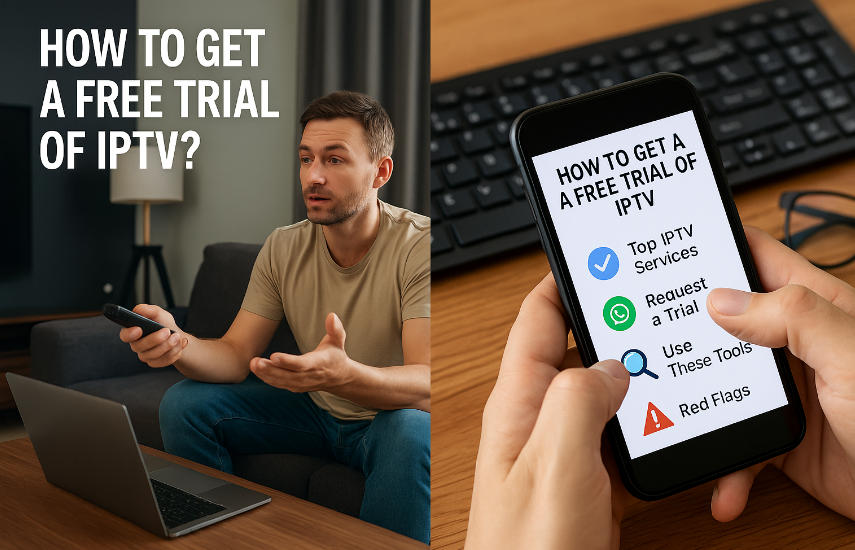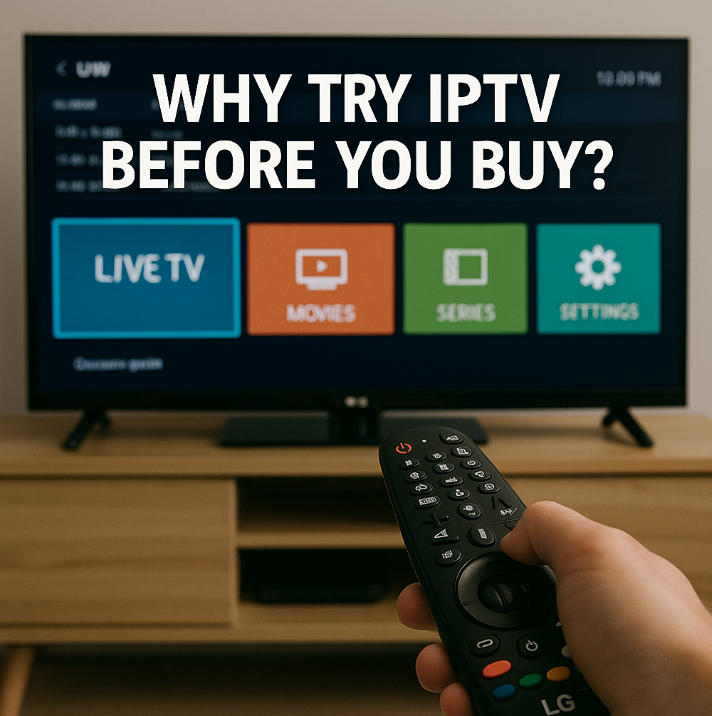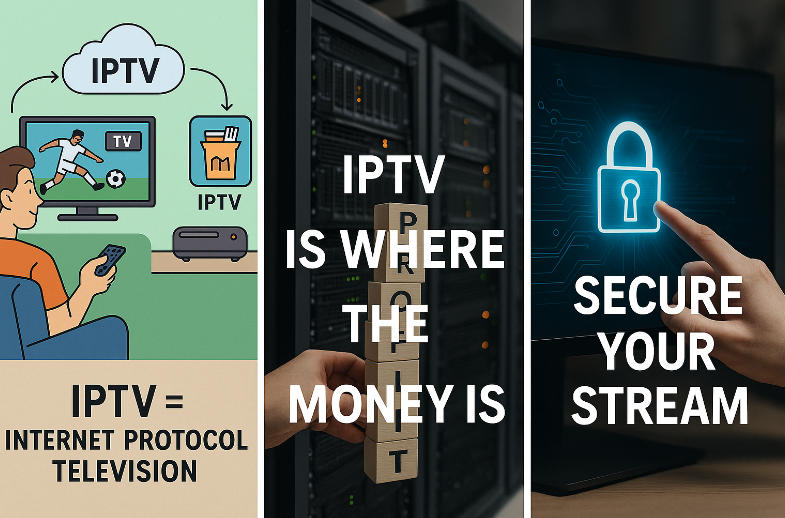Tired of paying $120 a month for cable, only to watch the same five channels? You're not alone. That’s why so many people are turning to cheap online TV streams. But one big question always comes up: is IPTV legal in USA? With flashy promises and dirt-cheap prices, it’s easy to fall into a gray zone without even realizing it. For legal background, the Protecting Lawful Streaming Act of 2020 explains how U.S. law treats illicit streaming services—primarily targeting operators, not end-users—so understanding the basics is crucial (Protecting Lawful Streaming Act, USPTO).

Think of IPTV like Netflix’s distant cousin—it streams TV over the internet, but not every “cousin” plays by the rules. Some services are squeaky clean, while others might land you in hot water. The FBI has even cracked down on illegal IPTV rings, warning that users could face real consequences, as seen in the Justice Department’s Jetflicks prosecutions (DOJ press release on Jetflicks sentencing).
This guide breaks it all down in plain English—what IPTV really is, how to spot the legal stuff, and what risks you’re taking if you don’t. Let’s clear the fog before you click “subscribe.” If you’re exploring legitimate services, you can also review an IPTV subscription option from a long-running provider like Star IPTV.
What is IPTV and how does it work?
IPTV flips traditional TV on its head—streaming your favorite shows over the internet instead of through bulky cables or dishes. If you want a plain-English primer, check out Star IPTV’s overview in What is IPTV and the in-depth IPTV subscription guide.
IPTV vs cable and satellite TV
IPTV is the modern-day upgrade to cable TV and satellite TV. Instead of using coaxial or satellite signals, IPTV delivers digital television through internet protocol via your broadband connection. This means:
No more weather-interrupted satellite TV signals
No messy cable boxes—just an internet connection and a device
On-demand content beats scheduled programming
| Feature | IPTV | Cable TV | Satellite TV |
|---|---|---|---|
| Signal Type | Internet Protocol | Coaxial Cable | Satellite Dish |
| On-Demand Access | Yes | Limited | Limited |
| Installation | Plug-and-play | Requires technician | Requires technician |
For practical streaming tips and device compatibility, Star IPTV’s IPTV streaming FAQ is a helpful companion.
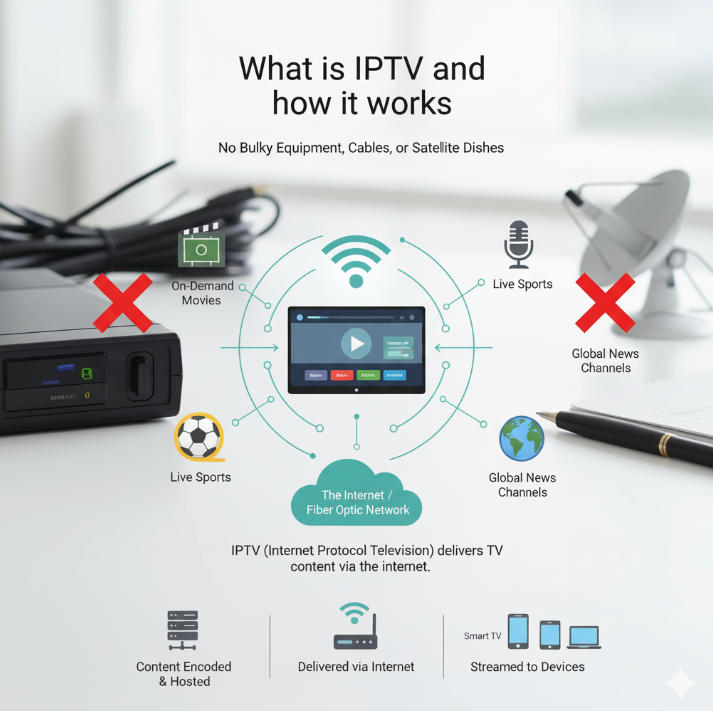
How IPTV streams digital content
IPTV turns your favorite shows into data packets and streams them over the internet—just like YouTube. Here’s the breakdown:
Content is encoded and stored on a Content Delivery Network (CDN)
When you hit play, the data travels via streaming protocols
Your device decodes the stream into watchable video
Some IPTV services offer live streaming, others are video on demand. A strong broadband connection keeps buffering at bay and delivers smoother playback. If you’re setting up a new device, a step-by-step IPTV setup guide can save time.
“IPTV is not just TV online—it’s a tech-forward content pipeline,” says Greg O’Neil, CTO at StreamWorks.
Types of IPTV services explained
There are different flavors of IPTV—some serve you live content, others let you rewind time (almost literally).
Live TV: Stream sports or news as it happens
Video on Demand (VoD): Watch movies and shows anytime
Time-Shifted TV: Missed last night’s episode? Rewind and catch up
Near VoD: Events like concerts streamed on a timed loop
Interactive TV: Choose what happens next (think Black Mirror: Bandersnatch)
These IPTV services often run on a subscription model or offer pay-per-view. Some even bundle all types into one slick platform. If you’re comparing plans, you might browse real-world IPTV Packages to see how features map to pricing.
Legal IPTV vs illegal IPTV
Not all IPTV services are built the same. Some play by the book, others fly under the radar. Let’s break down the difference before you get burned.
Licensed content vs pirated streams
Licensed content comes from services that pay for the copyright and distribution rights—think Hulu or YouTube TV. They’re legal, regulated, and pay content creators fairly. For a quick refresher on what copyrights protect (like public performance and distribution), see U.S. Copyright Office: What is Copyright? and the statutory list of exclusive rights (17 U.S.C. § 106).
Pirated streams, on the other hand, bypass all that. They distribute shows, movies, or live sports without permission. That means no revenue for the original creators and a whole lot of IP protection laws being broken—something repeatedly highlighted by federal prosecutions such as Jetflicks (DOJ case overview).
⚠️ Pirated = Illegal. Don’t let a cheap monthly fee fool you.
How shady IPTV services operate
Content acquisition – Ripped from legit services using capture cards or server hacks.
Distribution networks – Streams hosted on offshore servers to avoid U.S. law.
Payment methods – Cryptocurrencies and untraceable gateways make refunds impossible.
They offer subscription models, but you’re not buying TV—you’re funding piracy.
Examples of legal IPTV models
Subscription-based streaming: Like Hulu + Live TV or Sling TV—pay monthly, stream safely.
On-demand services: Think Netflix and Amazon Prime Video, operating under content provider deals that align with copyright basics.
Skinny bundles: Limited-channel packages with full legal distribution rights.
💡 “Good IPTV is just structured, legal TV over internet. Nothing shady.” – Adam Riley, Media Law Analyst
Why illegal IPTV looks legitimate
Illegal IPTV services don’t wear a skull and crossbones logo. They look like the real deal—with slick user interfaces, customer support, and flashy subscription packages.
You’ll see:
• Logos that mimic known brands
• “24/7 support” claims
• Professional marketing with “limited-time deals”
That polished appearance is designed to deceive and gain your trust. But beneath the surface, it’s just deception wrapped in legitimacy.
✅ Tip: If it feels too good to be true, it probably is. For a vetted plan, compare a legitimate IPTV subscription instead of gambling on mystery apps.
Is it illegal to watch IPTV in the USA?
“I used to pay $15 a month for IPTV that streamed every sports channel under the sun,” said Marcus G., a college student in Texas. “It felt like a win… until my internet provider warned me I was accessing illegal streams flagged for piracy.” That warning came with a Digital Millennium Copyright Act (DMCA) notice — not just a slap on the wrist, but a red flag that law enforcement tracks these things. If you’ve never seen one, here’s how the process works and what a notice usually looks like (DMCA notice & takedown process, Copyright Alliance).
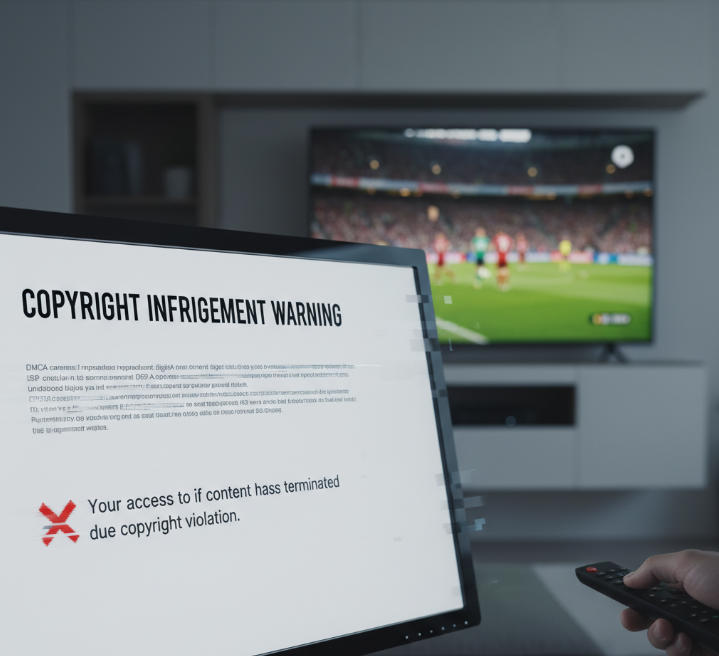
Under U.S. law, streaming copyrighted content without proper subscription from legitimate providers is considered copyright infringement. This includes IPTV services that deliver premium movies, sports, and pay-per-view content without paying for content rights. The FBI has publicly stated that IPTV services operating without licenses violate federal copyright laws and are subject to criminal prosecution—see the Jetflicks convictions and sentencings for a real-world example (DOJ press release).
✔️ Key Legal Facts:
Viewing pirated IPTV may trigger DMCA takedown notices (learn more about the process via the Copyright Office’s DMCA resources).
Repeat infringement can lead to fines or criminal investigation; courts can award statutory damages up to $150,000 per work for willful infringement (17 U.S.C. § 504).
“Just watching” does not make you invisible to internet service providers (see ISP policies like Xfinity’s DMCA Repeat Infringer Policy).
Tech attorney Jonathan Bailey told Forbes, “Consumers assume watching illegal IPTV is harmless. Legally, it is not. It is still access to stolen goods.”
Even free trials of unlicensed IPTV platforms carry risk. Always verify if the provider is registered and pays for rights to stream content legally. Otherwise, the cheap stream might cost you your digital safety — or worse. If you want to test a legit provider, consider an IPTV free trial from a compliant service.
Legal IPTV services in 2025
Looking for IPTV that won’t get you in trouble? Let’s break down the best legal options and see if those free apps are playing by the rules or cutting corners.

Top-rated IPTV providers this year
In 2025, legal IPTV services are crushing it with quality content, transparent pricing, and legit licensing. These aren’t your sketchy $10/month backdoor deals—these are top-rated platforms backed by major networks and streaming giants.
Here are the top contenders:
| Provider | Monthly Cost | Channels Offered |
|---|---|---|
| YouTube TV | $72.99 (intro), then $82.99+ | 100+ |
| Hulu + Live TV | $82.99 (promos may apply) | 95–100+ |
| Sling TV (Blue) | ~$46+ | 40+ |
"People aren’t just paying for channels—they’re paying for peace of mind," says digital media analyst Ryan Dalton. “Top-rated providers are all about licensed, high-quality content with no legal grey area.”
These services stand out not just for channel count but for reliable streaming, DVR options, and user-friendly interfaces. If you're serious about ditching cable without ditching the law, these are safe bets. For an alternative with global content and multi-device support, review Star IPTV’s IPTV Packages and IPTV setup guide.
Do free IPTV apps follow the law?
Some free IPTV apps talk a big game—endless channels, international sports, even premium movies. But ask yourself this: how are they offering all that... for free?
Most free apps don't pay for content rights. That’s a red flag.
Licensing is either vague or nonexistent. If you can’t trace the source, it’s probably shady.
"If it looks too good to be true, it usually is." — a reminder echoed by U.S. regulators about scammy offers, and the FTC has warned that pirate streaming apps can deliver malware (FTC Consumer Alert: malware in illegal streaming apps).
Legit free services do exist (think Pluto TV or Tubi), but they usually include ads and limit live TV. Free isn’t always illegal—but it often rides the line. Be smart and check the fine print. If you’re testing waters, consider a vetted IPTV free trial instead of mystery APKs.
What are the risks of using illegal IPTV?
1. Fines and legal penalties explained
Streaming unlicensed content can cost you—literally. Unauthorized streaming is a form of copyright infringement, and in the U.S., that can trigger civil lawsuits and monetary damages of up to $150,000 per violation (for willful cases under 17 U.S.C. § 504).
Civil lawsuits: Rightsholders can sue individuals, not just providers. (See damages examples under cable/satellite anti-piracy statutes like 47 U.S.C. § 605 and case filings citing penalties up to $110,000 in commercial exhibition disputes—e.g., Joe Hand Promotions overview.)
Criminal charges: Repeat or large-scale conduct may face prosecution (e.g., Jetflicks convictions & sentencing).
Fines: Range widely based on facts and statutes invoked.
2. Can IPTV use lead to jail time?
Yup, in extreme cases, jail time is on the table. While most casual viewers won’t get locked up, those involved in illegal streaming or distribution could face felony charges. The Protecting Lawful Streaming Act empowers DOJ to criminally pursue operators of large-scale illegal streaming services (PLSA summary).
Misdemeanor: Watching illegal streams isn’t always treated lightly—it depends on the state and volume.
Felony: Running or promoting IPTV services with pirated content can bring multi-year sentences (e.g., Jetflicks).
Quote: “The risk is real—users can be held criminally liable,” warns David Carson, copyright attorney at Stanford IP Law Center.
3. Deportation concerns for non-citizens
If you’re not a U.S. citizen, you’re playing with fire. Even minor criminal activity linked to IPTV can spark removal proceedings. Here’s how:
Deportation triggers: Any visa violation involving criminal conduct, including copyright crimes.
Permanent bans: A conviction tied to piracy may lead to permanent inadmissibility to the U.S.
Real talk: “One IPTV app is not worth your green card,” said a former ICE officer during a 2023 interview. (For context on criminal enforcement of streaming cases, see ICE/HSI streaming indictment archive.)
4. Security risks from shady IPTV apps
Some shady IPTV apps are more dangerous than pirated movies—they’re a hacker’s goldmine. They sneak in malware, phishing tools, and data theft scripts that can mess with your device.
Some apps demand full permissions (camera, mic access—sketchy!).
They run over unsecured networks, exposing users to privacy breaches.
One test by cybersecurity firm Vireguard found that 6 in 10 pirated IPTV apps carried spyware. For consumer-grade guidance, the FTC warns about malware in illegal streaming apps.
5. ISP tracking and privacy exposure
Illegal IPTV doesn’t just invite lawsuits—it can spotlight your entire internet life. ISPs monitor traffic to flag IP addresses tied to copyright violations and operate repeat-infringer policies.
| Activity Type | Risk Level | ISP Action |
|---|---|---|
| Streaming pirated IPTV | High | May issue warning letters |
| Repeated violations | Very High | Throttle or suspend service |
| VPN usage | Moderate | Might reduce traceability |
ISPs do send escalating alerts and can throttle or suspend accounts under repeat-infringer policies (see Xfinity policy and historical CAS FAQ from EFF).
How to choose a legal IPTV provider?
“When I picked my IPTV service, I did not just look at the price,” says Mike Rawlins, a tech reviewer at StreamSmart Weekly. “I asked one question: does this provider follow copyright laws and have proper content licensing?” That question alone can steer you away from risky deals and into safe territory.
Choosing a legal IPTV provider is not about flashy apps or fancy logos. It starts with reading the terms of service—the fine print where legal providers disclose licensed content agreements. Look for mentions of licensing bodies or rights partnerships. If a provider avoids that language, it is a red flag. If you want examples of how a compliant service structures plans and device support, review Star IPTV’s IPTV subscription options, IPTV streaming basics, and setup guide.
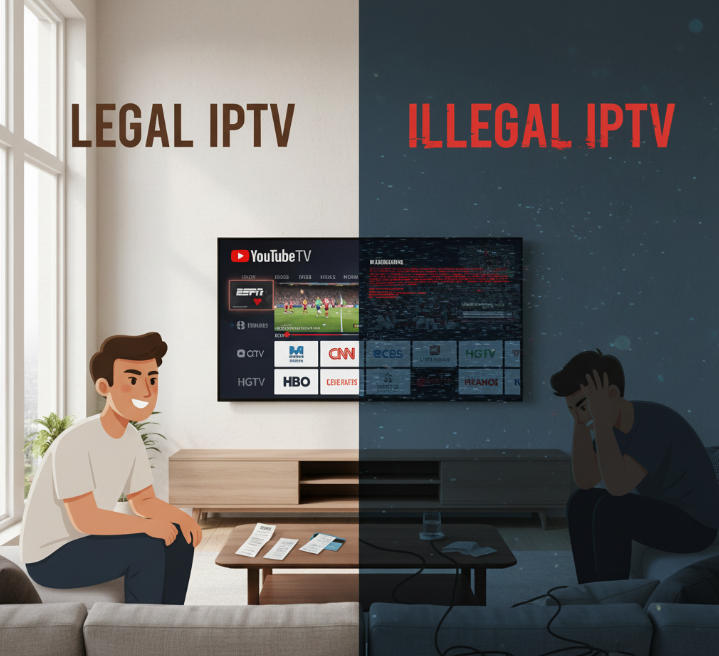
Top indicators of a trustworthy IPTV provider:
Clear subscription fees with no backdoor charges
Transparent channel selection backed by official partnerships
Strong provider reputation backed by industry awards or reviews
Streaming quality that does not fluctuate under legal pressure
No geographic restrictions bypass with VPN-reliant tricks
Dr. Emily Stokes, a media law expert at NYU, confirms, “Services that respect international copyright laws always state their rights ownership openly. It is not optional—it is compliance.”
Before paying, search customer reviews on Reddit, Trustpilot, and tech forums. Legal services like Hulu Live or YouTube TV hold licenses and are consistently praised for performance. Illegal ones? They vanish, glitch, or worse—harvest your data. If you’re a business, reseller, or venue, explore Bulk buyers IPTV and reseller solutions to stay compliant.
No shortcuts exist here. Legal IPTV costs more, but gives peace of mind. And in this space, peace of mind is priceless.
Conclusion
Streaming TV through IPTV feels like finding a back door to cable—cheaper, faster, and way more tempting. But not all doors lead somewhere safe. Some open straight into legal trouble you didn’t see coming.
“Illegal streaming services are not a harmless shortcut—they’re a crime,” warns the U.S. Department of Justice. That $5 a month deal could end up costing you a lot more (for a recent example, see DOJ: Jetflicks sentencings).
Bottom line? Stick with legit services. If a provider isn’t playing by the rules, you’re the one who might get burned. When you’re ready to compare compliant plans, start with an IPTV subscription or test a reputable free trial and follow the IPTV setup guide to get up and running the right way.
What is IPTV and how does it work?
What is the difference between legal and illegal IPTV?
Is watching IPTV in the U.S. illegal?
What risks come with using illegal IPTV services?
Legal risks: Civil lawsuits with fines up to $150,000 per work.
Criminal charges: Especially for large-scale or repeated infringement.
ISP warnings: Your internet provider may throttle or suspend your service.
Privacy/security threats: Illegal apps may contain malware or steal data.
Immigration issues: Non-citizens could face visa problems or deportation if convicted.
Are all free IPTV apps illegal?
How can I tell if an IPTV provider is legal?
Clear licensing or content rights information.
Transparent, official payment methods.
Stable service and customer support.
Positive reputation or industry recognition.
What are some legal IPTV services available in the U.S.?
YouTube TV
Hulu + Live TV
Sling TV


